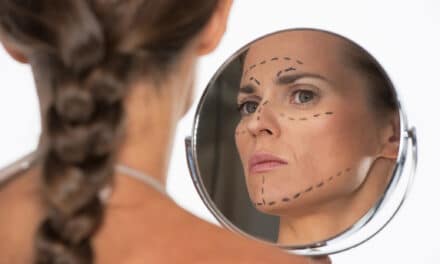In an early clinical test, a gene-based treatment for aging developed by Jeune Aesthetics showed promising initial results.
Jeune Aesthetics, a subsidiary of Krystal Biotech, announced positive proof-of-concept efficacy data from Cohort 2 of the PEARL-1 study of KB301, Jeune Aesthetics’ gene-based treatment for aging skin.
KB301 is designed to address declining collagen levels by delivering the human COL3A1 gene to increase the production of normal type III collagen at the administration site.
KB301 leverages Krystal’s gene delivery platform to restore protein production and rebuild the underlying extracellular matrix structure.
“We are pleased to see results supporting the clinical benefits afforded by KB301, especially improvement of fine lines and texture in the cheek and improved thickness results in the knee, with only minimal adverse events across all injection sites,” said Bhushan Hardas, MD, president of Jeune Aesthetics. “We look forward to advancing KB301 into Phase 2 testing later this year, as well as progressing the rest of the Jeune Aesthetics’ pipeline as we work to create a new category of aesthetic medicine designed to address – and potentially reverse – biological changes in aging skin.”
The Phase 1 dose-ranging trial evaluated the safety, tolerability, and initial efficacy of intradermal injections of KB301 in adult subjects aged 18-75.
In Cohort 1, three different dose levels of KB301 were evaluated in seven healthy subjects who received two intradermal injections into healthy buttock tissue 30 days apart.
KB301 injected areas were compared to non-injected or saline-injected control tissue within the same subject. Treatment and control sites were biopsied on day 2 or day 32.
KB301 was shown to be well tolerated for COL3A1 supplementation in healthy human subjects, supporting the clinical progression of KB301 for the treatment of aesthetic skin conditions.
Complete results from Cohort 1 focused on safety were presented at the 2021 Society for Investigative Dermatology (SID) Annual Meeting.
Low dose KB301 was well tolerated by subjects. Adverse events observed were injection site reactions (ISRs), with 100% of the adverse events categorized as mild. The adverse events were transitory and dramatically reduced during follow-on injections.
Before and after picture evaluations showed clear improvement in fine lines and texture in patients administered with a low dose of KB301.
Blinded independent reviewer assessments using JASRS and JAFLS did not show clinical separation between active and placebo. These scales, developed specifically for this skin area, will be further developed, validated, and adapted by Jeune Aesthetics specifically for KB301 before advancing development.
“KB301 has the potential to address not just the look of aging skin, but the aging process itself,” said Steve Yoelin, MD, an ophthalmologist and distinguished researcher, clinician, corporate strategic advisor, and speaker. “Currently, there are no aesthetic treatment options that truly rebuild the architecture of the dermis to address the fundamental biology of aging. In my view, KB301 complements existing medical aesthetics and has the potential to change the field of aesthetic medicine.”
Subjects from the PEARL-1 Cohort 2 trial will be enrolled in a durability trial to look for duration of effect, reduction of the unevenness in placebo treated sites, and for long term safety monitoring.
Based on the results from Cohort 2, Jeune Aesthetics is currently planning for two Phase 2a trials – one to improve skin quality attributes in the lower cheek and a second to evaluate the potential of improving the aesthetic appearance in a subject’s hand by increasing skin thickness on the back of the subject’s hands.
A third Phase 2 trial, to evaluate the improvement of skin quality attributes of KB301 in the upper cheek, will be initiated, following development and validation of Jeune Aesthetics’ scales in the upper cheek, specific to KB301.
Photo 177451808 © Prostockstudio | Dreamstime.com



